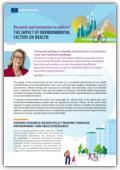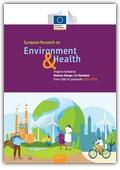What the Commission does
Human health depends on the quality of our environment. Therefore disruptive transformations of healthy and resilient ecosystems pose a threat to human health and wellbeing.
Due to public concern and the need to protect citizens' health from impacts of environmental degradation, the European Union has over the past decades established an extensive framework of thematic programmes, strategic objectives and regulatory actions that are related to environment and health.

- Factsheet
- 5 October 2023
The quality of the environment we live and work in is a powerful determinant of our health and well-being. Environmental factors such as air, soil and water quality have a significant influence in the risk and incidence of disease.
With the delivery of significant contributions towards a number of the Commission's 2019-2024 Priorities, environment and health research and innovation is framed by several wider strategies and policy initiatives within a rich EU policy context, such as:
- European Green Deal
- 8th Environmental Action Programme to 2030
- Chemicals Strategy for Sustainability
- Zero Pollution Action Plan
- EU strategic framework on health and safety at work 2021-2027
- The European Health Union
- The Horizon Europe missions
The implementation of EU supported environment and health research delivers research results and innovation across various domains. This includes the generation of harmonised data for risk assessment, advancement of technologies, contribution towards informed decision-making and production of knowledge applicable in the academia, health, pharmaceutical, policy-making, and public health sectors by protecting citizens' health and well-being.
Project clusters in Horizon 2020 and Horizon Europe
The clustering of projects funded under the same call topic is a strong tool to facilitate greater synergies, avoid overlaps and maximise the policy and societally relevant impact of Horizon 2020 and Horizon Europe projects.
In recent years, several clusters of projects have been formed under different areas of environment and health research. These clusters foster inter-project collaborations as well as a coordinated communication and dissemination of project results to the policy and regulatory sectors and to society at large.
There are currently 9 active project clusters in the environment and health portfolio:
- Animal-free Safety assessment of chemicals: Project cluster for Implementation of novel Strategies (ASPIS)
- Climate Change and Health Cluster
- Cluster on Electromagnetic fields Exposure and Health (CLUE-H)
- European research cluster to understand the health impacts of micro- and nanoplastics (CUSP)
- European Human Exposome Network (EHEN)
- European Cluster to Improve Identification of Endocrine Disruptors (EURION)
- Cluster on Indoor Air and Health (IDEAL)
- Cluster for Methods for assessing health-related costs of environmental stressors (METEOR)
- European Urban Health Cluster (UHC)
Other important initiatives
Partnership for the Assessment of Risks from Chemicals (PARC)
The European Partnership for the Assessment of Risks from Chemicals (PARC) was launched in May 2022. The Horizon Europe (Programme Cofund Actions) cofunds PARC with €200 million (2022-2029), out of a total budget of €400 million.
It brings together ministries and national public health and risk assessment agencies, as well as research organisations and academia, the European Chemicals Agency, the European Food Safety Authority and the European Environment Agency. PARC involves a total of 200 members (beneficiaries, affiliated entities and associated partners) from 27 countries (22 EU Member States, 3 Associated Countries, as well as Switzerland and the UK).
This ambitious partnership aims to establish a research and innovation hub of excellence to support the EU and national chemical risk assessment and management efforts with new data, knowledge, methods, networks and skills to address current and emerging chemical safety challenges.
With the goal of contributing to the implementation of the EU’s Chemicals Strategy for Sustainability towards a Toxic-free Environment, PARC strives towards the fundamental priority of better protecting human health and the environment. It builds upon previous accomplishments, including those of the European Human Biomonitoring Initiative (HBM4EU).
Portfolio of projects from the Horizon 2020 Green Deal call
Under Horizon 2020, research calls for proposals to support the European Green Deal (with a full budget of €1 billion) were launched in 2020. This call covered several areas of the European Green Deal, each with a separate set of topics.
For the ‘Zero-Pollution, Toxic free Environment’ area, two topics were published:
- Innovative, systemic zero-pollution solutions to protect health, environment and natural resources from persistent and mobile chemicals
- Fostering regulatory science to address combined exposures to industrial chemicals and pharmaceuticals: from science to evidence-based policies
3 projects were selected under the first topic and are supported by the EU with €40 million in funding. They are:
From the second topic, 3 additional projects were selected and are supported by the EU with funding of €20 million. They are:
All 6 projects began their work in 2021 and will continue for several years. The projects synergise and enhance efforts in areas related to policy, dissemination and communication, and technical aspects.
Funded projects
The Horizon Europe Work Programme funds projects dealing with a wide range of environmental stressors and their impacts on human health.
Calls for proposals are published primarily under Destination 2 of Cluster 1 of Horizon Europe (Health), entitled “Living and working in a health-promoting environment”.
Each call for proposal is subdivided into individual topics, which offer guidelines for proposals to be submitted in terms of both the scope they should cover and the outcomes to which they are expected to contribute. The topic text will also lay out the requirements that must be fulfilled by the applicants.
In 2021-2022, Horizon Europe funded 7 projects on indoor air quality and health (IDEAL cluster), 6 projects on the impacts of climate change on health (Climate Change and Health cluster), 4 projects on the impact of electromagnetic fields on health (CLUE-H cluster) and 5 projects on developing methods to assess the health-related costs of environmental stressors (METEOR cluster).
Ongoing topics
In 2023, the Horizon Europe work programme included 3 research and innovation actions and 1 coordination and support action. These actions opened for the submission of proposals in January 2023 and closed in April 2023:
For 2024, the Horizon Europe work programme includes a two-stage research and innovation action focusing on pollution and health. This action opened for submission of proposals in March 2023. The deadline for first-stage proposals was 19 September 2023. For second-stage proposals, the deadline was 11 April 2024:
- Planetary health: understanding the links between environmental degradation and health impacts
- Evidence-based interventions for promotion of mental and physical health in changing working environments (post-pandemic workplaces)
- Health impacts of endocrine-disrupting chemicals: bridging science-policy gaps by addressing persistent scientific uncertainties
- Global coordination of exposome research
- The role of environmental pollution in non-communicable diseases: air, noise and light and hazardous waste pollution
Future topics
There are no other future topics on environment and health foreseen in the Work Programme 2023-2024.
Past initiatives
European Human Biomonitoring Initiative (HBM4EU)
The European Human Biomonitoring Initiative (HBM4EU) was a European Joint Programme co-funded by Horizon 2020 with €50 million out of a total budget of €74 million (2017-2022).
HBM4EU developed a European programme for monitoring the exposure of European citizens to chemicals and understanding the potential impact of such exposures on human health. Furthermore, HBM4EU served as a research network builder that led to the establishment of PARC.
The main output of the programme is EU-wide evidence to support sound policymaking for effective chemical regulations in Europe. The data generated through HBM4EU are FAIR (findable, accessible, interoperable and reusable) and can be accessed via the European Commission’s IPCHEM data portal.
The results produced from HBM4EU, such as guidelines for various aspects of human biomonitoring, together with policy briefs, are openly available. In December 2022, the European Environment Agency published its Zero pollution monitoring assessment, including a chapter on health with contributions from HBM4EU results.
HBM4EU results were also considered as evidence for amending two directives to further improve the protection of workers by toughening the exposure limits to lead and diisocyanates in February 2023. HBM4EU studies were specifically acknowledged in these amendments.
You can learn more about the successes of HBM4EU by reading this Results in Brief article.
HERA coordination action
HERA was a coordination and support action (2019-2022), funded by Horizon 2020, including 24 participating institutions.
The project's overall aim was to identify priorities for the environment, climate and health research in the EU for 2020-2030. The final version of the EU research and innovation agenda is now available. It focuses notably on how to advance multidisciplinary and cross-sectoral understanding in the context of environment and health research and policies.
Documents

- Report
- 30 October 2023
The first two years of Horizon Europe, the ongoing EU Framework of Research and Innovation running from 2021-2027, have seen a substantial increase in the EU allocation to support environment and health projects on an annual basis. At the time of publication, already 84 projects have been funded, with an overall EU contribution of around € 587 million.
